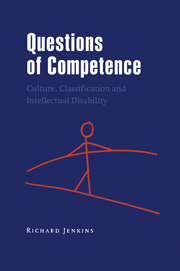Book contents
- Frontmatter
- Contents
- List of contributors
- 1 Culture, classification and (in)competence
- 2 Mental disability in the United States: an interactionist perspective
- 3 (In)competence in America in comparative perspective
- 4 Risk, resilience and competence: parents with learning difficulties and their children
- 5 Constructing other selves: (in)competences and the category of learning difficulties
- 6 Work, opportunity and culture: (in)competence in Greece and Wales
- 7 Slow cookers and madmen: competence of heart and head in rural Uganda
- 8 States and categories: indigenous models of personhood in northwest Greenland
- 9 Learning to become (in)competent: children in Belize speak out
- 10 Towards a social model of (in)competence
- Bibliography
- Index
10 - Towards a social model of (in)competence
Published online by Cambridge University Press: 16 January 2010
- Frontmatter
- Contents
- List of contributors
- 1 Culture, classification and (in)competence
- 2 Mental disability in the United States: an interactionist perspective
- 3 (In)competence in America in comparative perspective
- 4 Risk, resilience and competence: parents with learning difficulties and their children
- 5 Constructing other selves: (in)competences and the category of learning difficulties
- 6 Work, opportunity and culture: (in)competence in Greece and Wales
- 7 Slow cookers and madmen: competence of heart and head in rural Uganda
- 8 States and categories: indigenous models of personhood in northwest Greenland
- 9 Learning to become (in)competent: children in Belize speak out
- 10 Towards a social model of (in)competence
- Bibliography
- Index
Summary
The contributors to this collection have discussed the social construction of (in)competence in a range of local cultural contexts and from different points of view. Although their arguments and ethnographies are very varied, they nonetheless suggest some general conclusions.
The most obvious, in agreement with the few other available comparative discussions of (in)competence, is that there is no consistency between cultures – if it is possible to talk like this without reifying the notion of culture – with respect to the definition and understanding of (in)competence or the treatment of people who are categorised as incompetent. This is perhaps most clearly apparent in Patrick Devlieger's comparison of central Africa and the United States in Chapter 3, and in the differences between Greece and Wales – which are no less striking because of their subtlety – documented by Sylvia van Maastricht in Chapter 6. These two which make explicit comparisons aside, however, if the other papers are read side-by-side, cultural variability and the relativity of (in)competence are among the collection's central themes. All models are local models.
Perhaps even more interesting is the equally inescapable conclusion that we should not expect consistency, coherence, or consensus within cultures. Michael Angrosino argues in Chapter 2, for example, that in the United States the notion of ‘mental retardation’ is an ‘umbrella’ category, lumping together fundamentally un-alike individuals, reflecting bureaucratic priorities more than anything else. It is also a label that is contested and negotiated by those individuals in many different everyday ways.
- Type
- Chapter
- Information
- Questions of CompetenceCulture, Classification and Intellectual Disability, pp. 222 - 229Publisher: Cambridge University PressPrint publication year: 1999
- 2
- Cited by



